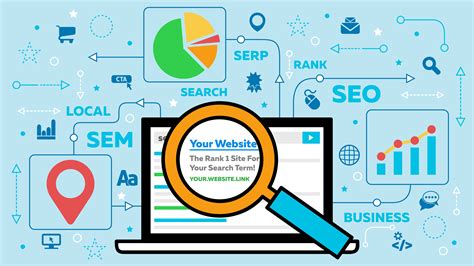Are you eager to take your online presence to new heights and leave your competitors in the dust? Looking to unleash the full potential of your digital platform and capture the attention of your target audience? It's time to delve into the world of maximizing your website's ranking on search engines.
Discover the essential strategies and techniques that will place your website on the radar of search engine algorithms, propelling it toward the top of the search results. By harnessing the power of cutting-edge optimization practices, you can secure a prime spot in the virtual landscape and draw in an abundance of organic traffic.
As you embark on this transformative journey, you'll explore the various facets of search engine optimization (SEO) and uncover invaluable insights into the algorithms that govern the internet. From employing advanced keyword research tactics to leveraging the potency of backlinks, this guide will equip you with the knowledge and tools necessary to ascend to digital prominence.
Take your website's visibility to the next level and forge ahead in the digital realm with confidence and distinction. With our top tips and strategies, your website will not only stand out but also thrive in the ultra-competitive online arena. Elevate your business to new heights and experience unprecedented success through search engine optimization prowess.
Optimizing Website Speed to Enhance Search Engine Performance

Boosting the loading time and overall speed of your website can greatly improve its visibility and success in search engine rankings. By optimizing website speed, your online platform becomes more accessible and user-friendly, showcasing a commitment to providing an exceptional user experience. This article explores practical strategies and techniques that can be implemented to accelerate website speed, leading to enhanced search engine optimization (SEO).
- 1. Minimize the use of heavy media files: Image and video files often contribute to slower website performance. Prioritize compressing images and videos without compromising visual quality, using efficient formats and sizing methods.
- 2. Utilize browser caching: Enable browser caching to store certain elements of your webpage on visitors' devices, reducing the need to download them again when users revisit your site.
- 3. Optimize coding and scripting: Streamline your website's HTML, CSS, and JavaScript coding to eliminate unnecessary elements that may impede loading speed. Minify files by removing whitespace and comments, and ensure efficient coding practices are implemented.
- 4. Leverage content delivery networks (CDNs): Utilize CDNs to store and deliver your website's static content across multiple servers strategically located worldwide. This can significantly reduce loading times, particularly for visitors accessing your site from different geographic regions.
- 5. Prioritize mobile responsiveness: The increasing number of mobile users emphasizes the importance of optimizing websites for mobile devices. Ensure that your website is mobile-responsive, as it not only enhances user experience but also contributes to improved search engine rankings.
- 6. Monitor and manage plugins: Excessive use of plugins can slow down your website. Regularly review and eliminate unnecessary plugins, keeping only the ones essential for your website's functionality.
- 7. Employ a reliable hosting provider: Choose a hosting provider that offers fast and reliable server connections. A well-performing server can significantly impact website speed, ultimately benefiting your search engine ranking.
By implementing these practical tips, you can optimize your website speed, leading to improved search engine optimization. Enhancing the loading time and overall performance of your website creates a positive user experience, boosting visitor engagement and increasing the likelihood of higher search engine rankings. Stay ahead of the game by continuously monitoring and evaluating your website's speed and implementing necessary adjustments.
Enhance your website's visibility by optimizing its content with relevant keywords
Advancing the visibility and reach of your website is a crucial aspect of online success. To attract more organic traffic and improve your website's presence in search engine results, it is essential to optimize your website content with relevant keywords.
When creating content for your website, it is important to identify and incorporate keywords that are relevant to your target audience and industry. These keywords should reflect the topics and themes that your website and business revolve around, enabling search engines to recognize the relevance of your content to users' search queries.
Instead of solely focusing on keyword density, it is recommended to prioritize the quality and natural incorporation of keywords within your content. Balancing keyword usage with engaging and informative content is key to optimizing your website effectively.
Start by conducting keyword research to identify popular and industry-specific terms that are frequently searched for by your target audience. Utilize online tools and analytics to determine which keywords will yield the highest potential for driving relevant traffic to your website.
Once you have identified your target keywords, incorporate them strategically within your website's content, including headings, subheadings, paragraphs, and meta tags. Ensure that the keywords flow naturally within the text, providing valuable information to your readers while also signaling to search engines the relevancy of your pages.
Remember, the goal is not to overload your content with keywords, but rather to use them in a meaningful and contextual manner that enhances user experience and boosts your website's visibility in search engine results.
Regularly monitor and adapt your keyword strategy as trends and user preferences change. Stay up-to-date on the latest industry trends and adjust your content to align with the evolving needs and interests of your target audience.
By optimizing your website's content with relevant keywords, you can significantly improve its search engine rankings and attract a larger audience of interested users. Take the time to conduct thorough keyword research and carefully implement them within your website, and you will reap the benefits of increased visibility and organic traffic.
Enhancing Website Visibility through Building High-Quality Backlinks

In this section, we will explore effective strategies and techniques that can significantly boost your website's visibility on search engines. By focusing on the creation of high-quality backlinks, you can enhance your website's rankings and increase its online presence.
1. Quality Content: One of the key factors in building valuable backlinks is to create compelling and relevant content on your website. By offering informative and engaging content, you naturally attract more visitors and increase the chances of other websites linking back to your site.
2. Guest Blogging: Collaborating with reputable websites and contributing guest blog posts is another effective method of acquiring quality backlinks. Writing valuable content for other websites in your niche allows you to showcase your expertise and establish credibility, thereby attracting more backlinks to your own site.
3. Influencer Outreach: Engaging with influencers in your industry can be a highly impactful way to build backlinks. By establishing relationships with experts, bloggers, and influencers, you can encourage them to link back to your website, leveraging their authority and increasing your visibility to a wider audience.
4. Broken Link Building: Identifying broken links on authoritative websites in your niche and offering relevant replacement content is an excellent opportunity to secure valuable backlinks. By reaching out to website owners and informing them of the broken links, you can suggest your own content as a replacement, providing a win-win situation for both parties.
5. Social Media Promotion: Promoting your website content via social media platforms is not only an effective way to drive traffic but also a means of obtaining backlinks. When your content is shared on social media, it increases the chances of other websites referencing and linking back to it.
6. Online Directories and Listings: Submitting your website to reputable online directories and listings can help improve your backlink profile and boost your website's visibility. Ensure that you select directories that are relevant to your niche and have a good reputation to maximize the benefits.
7. Internal Linking: Incorporating internal links within your website's content is an often overlooked but useful strategy. By linking relevant pages within your site, you enhance the user experience, increase engagement, and provide search engines with a clear structure of your website, which can positively impact your rankings.
Implementing these strategies and consistently investing in building high-quality backlinks can greatly enhance your website's visibility on search engines. By diversifying your backlink profile and focusing on quality over quantity, you establish credibility, improve rankings, and attract organic traffic to your website.
Enhancing Search Engine Results with Meta Tags and Descriptions
In today's digital landscape, optimizing your online presence is crucial for achieving visibility and driving organic traffic. When it comes to improving your website's performance on search engines, utilizing meta tags and descriptions can significantly impact your search engine results.
Meta tags and descriptions serve as concise summaries of the content on your webpages. These elements provide search engines with valuable information about your website, helping them understand the context and relevance of your pages. By strategically crafting and optimizing your meta tags and descriptions, you can enhance your website's search engine visibility and attract more targeted organic traffic.
The meta title tag acts as the headline of your webpage in search engine results. It is important to create unique, descriptive, and keyword-rich titles that accurately reflect the content of each page. Well-optimized meta titles can significantly improve your click-through rates and ensure that search engines understand the focus of your page.
Meta descriptions, on the other hand, provide a brief overview of your webpage's content. They play a crucial role in convincing users to click through to your site from search engine results. Crafting compelling meta descriptions that accurately summarize your content and include relevant keywords can greatly improve your website's click-through rates.
In addition to improving click-through rates, properly optimized meta tags and descriptions also contribute to higher search engine rankings. When search engines understand the content and context of your pages, they can better match them with relevant search queries. This, in turn, improves your website's chances of appearing higher in search engine results.
It is essential to note that meta tags and descriptions should be unique for each page on your website. By tailoring these elements to the specific content of each page, you enhance search engine understanding and enhance the overall user experience.
So, make sure to prioritize the optimization of your meta tags and descriptions. By crafting unique, engaging, and keyword-rich elements that accurately represent your webpage's content, you can boost your website's visibility, attract targeted organic traffic, and ultimately improve your search engine results.
Creating an optimized mobile experience for enhanced user satisfaction

In today's digital landscape, it is crucial for websites to adapt to the increasing prevalence of mobile devices. Ensuring your website is mobile-friendly not only improves user experience and satisfaction but also has a positive impact on your website's performance in search engine rankings. This section delves into the strategies and practices for creating a mobile-friendly website that caters to the needs and preferences of mobile users.
The significance of mobile optimization
With the exponential growth of smartphone usage, mobile optimization has become a key factor in maintaining a competitive online presence. It involves designing and developing websites to be visually appealing, function smoothly, and provide seamless navigation and user interaction on mobile devices.
Responsive web design
An essential aspect of creating a mobile-friendly website is utilizing responsive web design. This approach ensures that your website automatically adapts to the screen size, orientation, and capabilities of the device being used. By employing fluid grids, flexible images, and CSS media queries, responsive design allows your website to provide an optimal experience across a wide range of devices, including smartphones, tablets, and desktop computers.
Streamlined content and intuitive navigation
When optimizing your website for mobile users, it is essential to prioritize content and simplify navigation. Mobile screens have limited space, and users tend to interact with websites differently on mobile devices compared to desktops. Therefore, it is crucial to focus on concise and relevant content, ensuring that it is easily scannable on smaller screens. Additionally, simplifying navigation menus and incorporating intuitive touch-friendly elements can enhance the overall user experience.
Page load speed optimization
Mobile users are often on-the-go and have limited patience for slow-loading websites. Thus, optimizing your website's page load speed is paramount. Minimizing file sizes, leveraging browser caching, and reducing the number of HTTP requests are some effective techniques for improving page load speed. Prioritizing performance optimization not only enhances user satisfaction but also positively impacts search engine rankings.
User testing and ongoing optimization
Creating a mobile-friendly website requires continuous improvement through user testing and ongoing optimization efforts. Soliciting feedback from mobile users, analyzing website analytics, and staying updated with the latest industry trends can help identify areas for improvement and refine the mobile experience on your website.
In conclusion, having a mobile-friendly website is vital for providing an enjoyable and seamless experience to mobile users. By implementing responsive design, optimizing content and navigation, improving page load speed, and consistently refining your website based on user feedback, you can elevate your website's performance and cater to the growing audience of mobile device users.
Regular Updates and Maintenance: The Key to Boosting Your Website's Visibility
In today's rapidly evolving digital landscape, staying ahead of the competition is crucial for the success of your online presence. To achieve higher visibility on various search engines, such as Google, Bing, or Yahoo, it is essential to regularly update and maintain your website. By consistently refreshing your content, optimizing keywords, and ensuring smooth functionality, you can improve your website's ranking and attract more organic traffic.
1. Fresh and Relevant Content:One of the most effective ways to enhance your website's visibility is to provide fresh and relevant content to your audience. Internet users are constantly seeking up-to-date information, and search engines prioritize websites that offer the latest and most valuable content. Regularly adding new articles, blog posts, or product updates keeps your website current and encourages search engines to crawl and index your pages more frequently. |
2. Keyword Optimization:Selecting and incorporating relevant keywords throughout your website is vital for improving rankings. Regularly analyze and research trending keywords within your industry to ensure your content aligns with current search queries. By optimizing your headings, meta descriptions, and alt tags for these keywords, you increase the likelihood of search engines recognizing your website as a reliable source of information. |
3. Smooth Website Functionality:A website with a smooth and user-friendly interface not only provides a positive experience for visitors but also benefits your search engine rankings. Regularly check for broken links, fix errors, and enhance loading speed to ensure optimal performance. Pay attention to mobile responsiveness as well, as search engines prioritize mobile-friendly websites in their rankings. |
4. Engage with Social Media:Regularly engaging with social media platforms can greatly contribute to improving your website's visibility. Actively sharing your website's content on social media channels and encouraging social media shares and likes can increase brand awareness and generate backlinks, both of which are essential for better search engine rankings. |
By embracing the practice of regularly updating and maintaining your website, you demonstrate to search engines that your website is an active contributor to the digital realm. Through fresh, relevant content, optimized keywords, exceptional functionality, and social media engagement, you can steadily elevate your rankings and attract a larger audience to your online platform.
FAQ
How can I improve my website ranking on search engines?
There are several tips you can follow to improve your website ranking on search engines. First, make sure your website is optimized for relevant keywords by conducting keyword research and incorporating them into your website content. Next, focus on creating high-quality and valuable content that is regularly updated. Additionally, ensure your website has a user-friendly and responsive design, as well as fast loading speed. Building high-quality backlinks from reputable websites and utilizing social media platforms can also positively impact your website's ranking.
Is it important to conduct keyword research for my website?
Yes, conducting keyword research is crucial for optimizing your website and improving its ranking on search engines. By identifying the relevant keywords that your target audience is using to search for information, products, or services related to your website, you can strategically incorporate them into your website content. This helps search engines understand the relevance and context of your website, thus increasing its visibility in search results and attracting more organic traffic.
How frequently should I update the content on my website?
Updating your website's content regularly is highly recommended for improving its ranking on search engines. By adding fresh and valuable content to your website, you show search engines that your website is active and relevant. The frequency of content updates may vary depending on your website's niche or industry, but aim to publish new content at least once a week. Additionally, you can update existing content to keep it up-to-date and provide users with the most accurate and current information.
Why is having a user-friendly website design important for search engine ranking?
A user-friendly website design is essential for improving your website's ranking on search engines. When your website is easy to navigate, loads quickly, and provides a positive user experience, visitors are more likely to stay longer on your site, engage with your content, and ultimately convert. Search engines consider user behavior metrics, such as bounce rate and time spent on site, as indicators of a website's quality. Therefore, a user-friendly design can help increase these metrics and signal to search engines that your website is valuable, resulting in higher rankings.
How do backlinks affect my website's ranking on search engines?
Backlinks play a crucial role in improving your website's ranking on search engines. Search engines view backlinks as votes of confidence from other websites, indicating that your content is valuable and trustworthy. The quality and relevance of the websites linking to your site are crucial factors to consider. Obtaining backlinks from reputable and authoritative websites in your industry can significantly boost your search engine ranking. However, it's important to focus on building natural and organic backlinks rather than engaging in black hat SEO practices, as search engines may penalize websites that manipulate their ranking through spammy or irrelevant backlinks.



